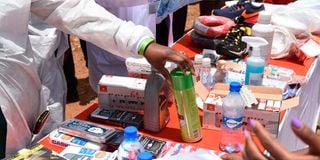Premium
Alcohol, medicine get priority ahead of trademark deadline

Part of an assortment of counterfeit goods worth Sh27.4 million impounded in Eldoret town. Alcohol beverages, pharmaceuticals, and cosmetics have been placed on a priority list as traders and their agents scramble to beat a January 1, 2023 deadline to register the intellectual property rights (IPRs) on all goods to be shipped into Kenya.
Alcohol beverages, pharmaceuticals, and cosmetics have been placed on a priority list as traders and their agents scramble to beat a January 1, 2023 deadline to register the intellectual property rights (IPRs) on all goods to be shipped into Kenya.
The Anti-Counterfeit Authority (ACA) said listing will also be fast-tracked for clothing, footwear, electronics, and electrical imports.
“All recorded IPRs shall be accorded proactive protection against counterfeit imports under the provisions of the Anti-Counterfeit Act,” said Robi Mbugua Njoroge, executive director of ACA.
The agency said IPRs of all goods brought in will be mandatorily registered with it irrespective of their place of origin as part of a strategy to deal with rising trade in counterfeits in Kenya.
The changes introducing the mandatory recording of IPRs are contained in Section 34B of the Anti-Counterfeit Act, Legal Notice No.117, and Legal Notice No.118 of 2021.
The new IPRs registration requirement means it will be illegal to import goods into Kenya for commercial purposes if they bear a trademark, trade name, or copyright that is not recorded in the State agency’s database.
Failure by importers to adhere to this requirement will result in prosecution and penalties.
Penalties
According to the law, the penalty for a first-time offender is three times the value of the prevailing retail price of the goods while a subsequent offender will be penalised five times the value of the prevailing price of the products.
A first-time offender is also liable to an imprisonment term not exceeding five years while a subsequent offender’s imprisonment term is a maximum of 15 years. This penal consequence is in addition to the ACA seizing and forfeiting for the destruction of the non-compliant imported goods.
Given the potential financial and criminal consequences, importers are pressed to ensure compliance.
Trading in counterfeits has become a multi-billion-shilling industry in Kenya, spanning all key sectors of the economy including car parts, alcoholic beverages and electrical appliances, medicines, building materials, baby foods, clothes, and cosmetics among others.
Under the new regulations, no IPR agent shall be eligible to perform any functions with ACA from January 1, 2023, unless they so admitted and registered. The ACA had earlier set a July 1, 2022 compliance deadline but gave an extension following disruptions linked to the August General Elections.





